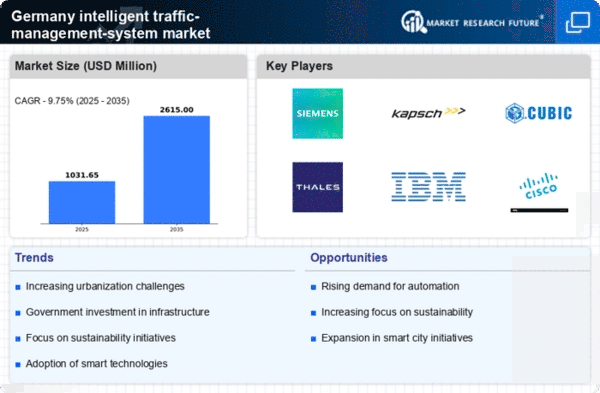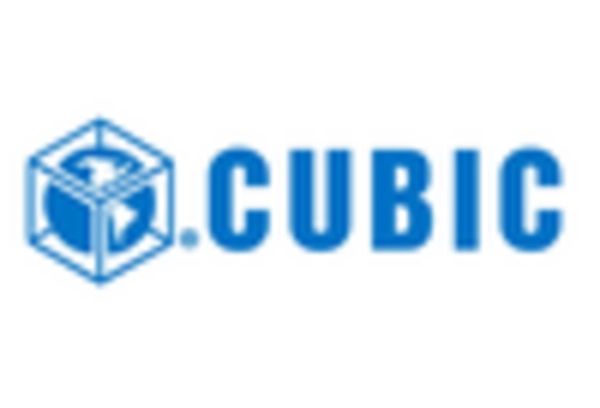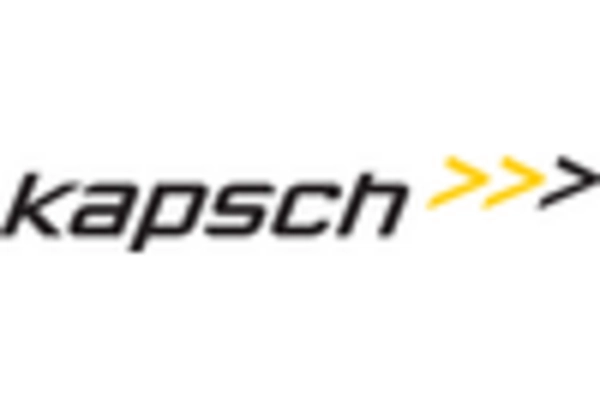Urbanization and Population Growth
The rapid urbanization in Germany is a crucial driver for the intelligent traffic-management-system market. As cities expand, the demand for efficient traffic solutions intensifies. The population in urban areas is projected to reach approximately 80% by 2030, leading to increased vehicular congestion. This growth necessitates advanced traffic management systems to optimize flow and reduce delays. Moreover, the is projected to witness a compound annual growth rate (CAGR) of around 15% in the coming years., driven by the need for smart solutions to manage urban mobility effectively. The integration of real-time data analytics into these systems can significantly enhance traffic monitoring and control, thereby improving overall urban transport efficiency.
Investment in Smart City Initiatives
The push towards smart city initiatives in Germany is a significant driver for the intelligent traffic-management-system market. Municipalities are increasingly investing in technologies that enhance urban living, with traffic management being a critical component. The German government has allocated substantial funding for smart city projects, with an estimated €1 billion earmarked for digital infrastructure improvements. This investment is expected to facilitate the deployment of intelligent traffic systems that integrate with other urban services, such as public transport and emergency response. As cities strive to become more interconnected and efficient, the intelligent traffic-management-system market is likely to experience robust growth, driven by the need for comprehensive solutions that address the complexities of modern urban mobility.
Public Safety and Traffic Management
Public safety remains a paramount concern in urban areas, influencing the intelligent traffic-management-system market. With rising traffic incidents, there is a pressing need for systems that enhance road safety. Intelligent traffic management solutions can provide real-time data on traffic conditions, enabling quicker responses to accidents and emergencies. In Germany, the implementation of smart traffic signals and surveillance systems is projected to reduce accident rates by approximately 20%. This focus on safety is likely to drive investments in intelligent traffic management technologies, as municipalities prioritize systems that not only improve traffic flow but also safeguard citizens. The is positioned to grow as safety becomes increasingly integrated into urban planning..
Technological Advancements in Transportation
Technological innovations are reshaping the landscape of the intelligent traffic-management-system market. The advent of connected vehicles and smart infrastructure is facilitating the development of sophisticated traffic management solutions. In Germany, the implementation of Vehicle-to-Everything (V2X) communication is gaining traction, allowing vehicles to interact with traffic signals and other road users. This technology is expected to enhance traffic flow and safety, potentially reducing traffic-related incidents by up to 30%. Furthermore, the intelligent traffic-management-system market is likely to benefit from advancements in artificial intelligence and machine learning, which can analyze vast amounts of data to predict traffic patterns and optimize signal timings, thereby improving the overall efficiency of urban transport systems.
Environmental Concerns and Emission Regulations
Growing environmental concerns are driving the intelligent traffic-management-system market in Germany. The government has set ambitious targets to reduce greenhouse gas emissions, aiming for a 55% reduction by 2030 compared to 1990 levels. This regulatory framework encourages the adoption of intelligent traffic management solutions that promote eco-friendly transportation. Systems that optimize traffic flow can significantly decrease fuel consumption and emissions, aligning with national sustainability goals. The The intelligent traffic-management-system market is likely to see increased investments as municipalities seek to implement solutions that enhance traffic efficiency. These solutions also contribute to cleaner air and reduced carbon footprints.. This alignment with environmental objectives is expected to foster market growth.
















